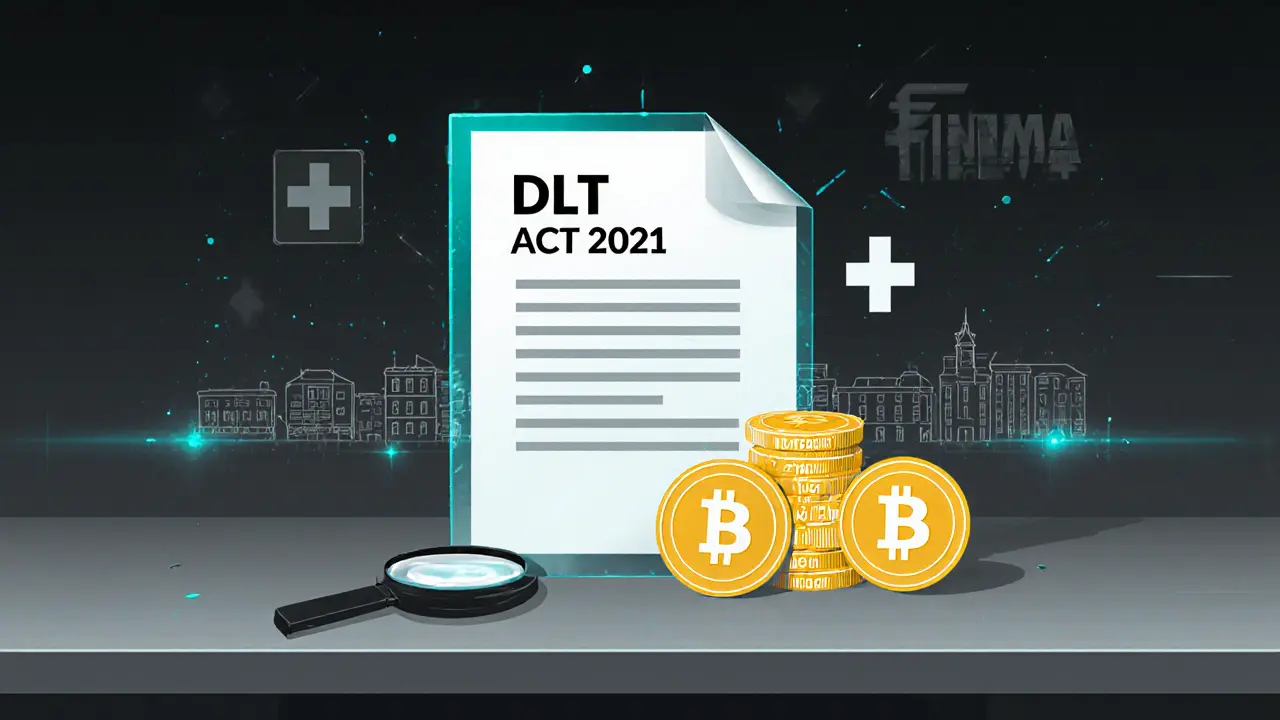Zug Crypto Tax Calculator
Switzerland's crypto-friendly tax policies offer significant advantages for blockchain businesses. Calculate how much you could save compared to other jurisdictions.
Tax Comparison
Save up to 0%Effective Tax Rate: 0%
Annual Tax: CHF 0
Tax-free on crypto transfers between wallets
10-year tax deductions for new enterprises
Effective Tax Rate: 0%
Annual Tax: CHF 0
When you think of crypto hubs, you might picture Miami’s beachside startups or Singapore’s sleek fintech towers. But one of the most powerful, quiet, and enduring crypto ecosystems isn’t in a flashy metropolis-it’s in Zug, Switzerland, a small canton with a population under 30,000. Since 2016, Zug has quietly built the world’s most legally secure environment for blockchain companies. It’s not about flashy tax breaks or free land. It’s about regulatory clarity-and that’s what makes it irresistible to serious players.
Why Zug? It’s Not Just About Bitcoin
Zug didn’t become Crypto Valley by accident. In 2016, the city started accepting Bitcoin for tax payments. That wasn’t a publicity stunt-it was a signal. The message was clear: if you’re building blockchain tech here, we’ll treat you like a legitimate business, not a risky outlier. Today, you can pay property taxes, business fees, and even parking tickets in Bitcoin or Ethereum. That kind of real-world integration is rare anywhere in the world. The real game-changer came in 2021 with Switzerland’s DLT Act (Distributed Ledger Technology Act). This law didn’t just tweak existing rules-it rewrote the legal playbook for digital assets. Under the DLT Act, tokenized assets like security tokens, utility tokens, and NFTs got clear legal status. No more gray zones. If you issue a token representing ownership in a company, it’s recognized as a financial instrument. If you issue a token for access to a service, it’s treated as a digital right. No ambiguity. No guesswork. This legal certainty is why the Tezos Foundation, Solana Foundation, Cardano Foundation, and DFINITY all chose Zug over Dubai, Singapore, or even San Francisco. They didn’t pick it for the weather. They picked it because they needed a jurisdiction where their legal structure wouldn’t collapse the moment a regulator changed their mind.Tax Advantages That Actually Matter
Switzerland’s corporate tax system is famously decentralized. Each canton sets its own rates. Zug, being smart, kept theirs low-between 12% and 15% for blockchain companies. Compare that to the global average of 20-25%, and you see why startups and funds are drawn here. But it’s not just about the headline rate. Zug offers ten-year tax deductions for new enterprises, a policy adopted by several Swiss cantons. That means a new blockchain company can reduce its taxable income to nearly zero for the first decade. That’s not a loophole-it’s a deliberate incentive to attract long-term investment. Capital gains on crypto held for more than a year are generally tax-free for private individuals. For companies, profits from crypto trading are taxable, but only if they’re part of regular business activity. If you’re holding Bitcoin as a treasury asset, like a startup keeping reserves, you’re not taxed on paper gains. That’s a huge difference from places like the U.S., where every price swing triggers a tax event. And here’s something most people miss: Zug doesn’t tax cryptocurrency transfers between wallets. If you move ETH from your company’s cold wallet to your custody provider, no reporting is needed. No transaction logs required. No FATF travel rule compliance headaches. That’s because Swiss law doesn’t classify crypto payments as regulated financial activity. That’s not a loophole-it’s a design choice.Regulatory Clarity Over Aggressive Incentives
Zug doesn’t hand out grants like Dubai does. It doesn’t promise free office space like Singapore. Instead, it gives you something more valuable: predictability. The Swiss Financial Market Supervisory Authority (FINMA) doesn’t say “yes” or “no.” It says “here’s what you need to do.” If you want to launch a crypto exchange, custody service, or tokenized fund, FINMA publishes clear guidelines. Their 2022 revision of the “Initial Coin Offerings” guidelines alone contains 47 specific interpretations of how different token models are treated under Swiss law. That’s why companies like Bitcoin Suisse, Sygnum Bank, and SEBA Bank all operate out of Zug. They need a regulator that speaks their language. Unlike in the U.S., where crypto firms spend years in legal limbo waiting for SEC guidance, Zug’s process is structured. You submit your application, you get feedback, you fix gaps, you get licensed. The average time to get a FINMA license is 3-6 months. Not years. The catch? It’s not easy. You need to prove you have solid AML/KYC controls, sufficient capital reserves, and a local compliance officer. You can’t just file paperwork online. But if you’re serious, you’ll find the process faster and more transparent than anywhere else in Europe.
Who’s Already Here-and Why
Zug is home to over 300 blockchain companies. That’s not a guess-it’s from the Crypto Valley Association’s 2024 report. These aren’t just small startups. They’re the foundations behind major protocols. The Cardano Foundation, for example, is legally registered as a Swiss foundation, giving it a neutral, nonprofit structure that’s recognized globally. The same goes for Tezos and Solana. Venture capital is pouring in. In 2023, CHF 2.3 billion (about $2.6 billion) was invested in Zug-based blockchain firms. That’s a 37% jump from the year before. And it’s not just crypto startups. Enterprise blockchain solutions make up 65% of projects here-supply chain tracking, digital identity, tokenized bonds. That’s because Zug attracts institutions, not just speculators. Zurich, Geneva, and Liechtenstein are also growing fast, but Zug remains the epicenter. Why? Because it’s the first place where the government, banks, and tech founders sat down and said: “Let’s build this together.”What’s Hard About Living and Working Here
Let’s be honest: Zug isn’t cheap. Office space averages CHF 1,200-1,500 per square meter per year. That’s more than double what you’d pay in Lisbon or Budapest. Salaries for blockchain engineers and compliance officers are among the highest in Europe. A senior blockchain developer here earns between CHF 140,000-180,000 annually. In Eastern Europe, that same role might pay half as much. Setting up a company takes time and money. Establishing a foundation costs CHF 15,000-25,000. Adding FINMA registration? Another CHF 10,000-15,000. Total setup time: 4-6 months. That’s fast by global standards, but it’s not “launch in a weekend” fast. And while the regulatory environment is clear, it’s also strict. If you’re trying to build a DeFi protocol with automated lending pools, you’ll hit walls. Swiss regulators are still cautious about permissionless DeFi. They want to know who’s in control. That’s why most DeFi projects here are either centralized or have a legal entity backing them.
What’s Next for Zug’s Crypto Hub
In August 2024, Zug expanded tax payment options to include more cryptocurrencies beyond Bitcoin and Ethereum. Now you can pay taxes in Solana, Polygon, and others. That’s not just convenience-it’s a signal that Zug is ready for the next wave of blockchain innovation. The Crypto Valley Association is launching “Regulatory Sandbox 2.0” in Q2 2025. This time, it’s focused on DeFi. Companies will be able to test decentralized lending, automated market makers, and tokenized derivatives under FINMA supervision-with legal protection from prosecution. That’s huge. It means Zug is finally ready to tackle the most complex part of crypto: permissionless innovation. The Swiss federal government is also working on a Crypto Tax Reform Package for 2025. It aims to clarify how long-term crypto holders are taxed, potentially aligning crypto gains with capital gains treatment for stocks. That would make Switzerland even more attractive to institutional investors.Is Zug Right for You?
If you’re a startup looking to raise venture capital and need a credible legal base, Zug is one of the best places on earth. If you’re building a tokenized asset, custody service, or blockchain infrastructure, you’ll get more clarity here than anywhere else. But if you’re a solo developer trying to launch a DeFi app with no legal entity, or you’re looking for cheap office space and quick cash grants, you’ll be frustrated. Zug doesn’t cater to hype. It caters to builders who need to sleep at night knowing their business won’t be shut down by a regulatory whim. The real advantage of Zug isn’t the tax rate. It’s the trust. When a Swiss foundation signs a contract with a bank, a pension fund, or a government agency, they know it’s enforceable. That’s the currency Zug trades in-and it’s worth more than any subsidy.Can I pay taxes in cryptocurrency in Zug?
Yes. Since 2016, Zug has accepted Bitcoin and Ethereum for tax payments. As of August 2024, the list expanded to include Solana, Polygon, and other major cryptocurrencies. Payments are processed through Bitcoin Suisse, and the value is locked at the time of transaction to avoid volatility risk.
Is Zug better than Singapore for blockchain companies?
It depends. Singapore offers more direct government funding and lower office costs, but Zug offers stronger legal certainty and global trust. Singapore’s MAS is sophisticated, but Zug’s DLT Act and FINMA guidelines provide clearer, more stable rules for tokenized assets and foundations. For institutional investors and legal entities, Zug is often preferred.
How long does it take to set up a blockchain company in Zug?
Typically 4-6 months. First, you establish a Swiss foundation (6-8 weeks, CHF 15,000-25,000). Then you apply for FINMA licensing (3-4 months, CHF 10,000-15,000). You’ll need local compliance support, proof of capital, and AML/KYC systems in place. It’s not fast, but it’s predictable.
Are crypto gains taxed in Switzerland?
For private individuals, crypto held for more than a year is generally tax-free on capital gains. For companies, gains are taxable only if crypto trading is part of regular business activity. Holding crypto as treasury reserves is not taxed on paper gains. Switzerland does not tax transfers between wallets.
What’s the biggest drawback of operating in Zug?
The biggest drawback is cost. Office space, salaries, and setup fees are among the highest in Europe. While regulatory clarity is a strength, it also means stricter compliance requirements. DeFi projects without legal entities face regulatory barriers. Zug isn’t for speculative or low-budget ventures.


17 Responses
zg is cool and all but like... why pay 15k just to setup a company? 🤡
bro Zug is the only place where you can pay taxes in SOL and still look cool AF 😎💸
Everyone else is still arguing if crypto is money or not. Meanwhile in Zug, the mayor’s got a crypto wallet and a Swiss army knife. 🇨🇭✨
What’s fascinating isn’t that Zug accepts crypto-it’s that they treated it like a tool, not a cult. They didn’t chase hype. They asked: ‘What does this enable?’ and then built a legal architecture around that question.
That’s philosophy in action. Not ‘get rich quick’-but ‘build something that outlives the boom and bust.’
Most places want to monetize innovation. Zug wants to domesticate it. And that’s the quietest kind of power.
It’s like Switzerland didn’t just open a door-they built a cathedral for certainty. And in a world of chaos, that’s the most valuable currency.
Honestly? I’ve seen so many founders burn out chasing grants and tax breaks in other places.
Zug doesn’t give you candy-it gives you a compass. And sometimes, that’s all you need to keep going when the market crashes.
You’re not building for a 2025 bubble-you’re building for 2035. And that’s worth every franc.
Let’s be real: the DLT Act isn’t just legislation-it’s a paradigm shift. Tokenized securities aren’t ‘crypto assets’ anymore-they’re fiduciary instruments with legal standing.
The Swiss didn’t adapt crypto to old law-they rewrote the law to accommodate the new paradigm.
This isn’t regulation. It’s epistemological sovereignty.
FINMA doesn’t just supervise-they co-evolve with the tech. That’s institutional maturity at a level no other jurisdiction has achieved. The U.S. is still in the ‘is this money?’ phase. Zug is already drafting the next edition of the economic textbook.
YESSSS! Zug is the quiet boss of crypto 🙌
No flashy billboards. No influencers. Just clean rules, smart people, and real infrastructure.
I’ve seen startups crash in the U.S. because of SEC uncertainty. Here? You know where you stand. That’s peace of mind. And peace of mind is the ultimate competitive advantage.
Also-paying taxes in ETH? Iconic. I’m so here for it.
Actually, the tax-free capital gains for private individuals is misleading. Switzerland doesn’t tax speculative gains if they’re classified as private assets-but if you trade frequently, you’re considered a professional trader and taxed as income. Many people don’t realize that.
Also, the ‘no tax on wallet transfers’ rule only applies if you’re not exchanging for fiat or goods. If you buy coffee with BTC, that’s a taxable event.
Zug’s rules are clear, yes-but they’re not magic. Just well-drafted.
It’s interesting how Zug’s model is essentially the opposite of what you’d expect from a crypto hub.
Most places scream ‘we’re the future!’ with neon signs and NFT art galleries.
Zug? Quiet streets, Swiss watches, and a government that treats blockchain like plumbing-essential, invisible, and built to last.
They didn’t try to be cool. They just made sure the foundation wouldn’t crack when the earthquake came.
And now, every other jurisdiction is scrambling to copy what they quietly did five years ago.
It’s like the difference between a TikTok trend and a library that’s been open since 1890.
One gets 10 million views. The other still holds every book ever written.
Which one do you trust when the lights go out?
Important note: the CHF 15K–25K setup cost for a foundation? That’s just the legal fee. You also need a local registered address (CHF 3K–5K/year), a compliance officer (CHF 80K–120K/year), and AML software (CHF 10K–20K setup).
Plus, FINMA requires a minimum equity of CHF 100K for crypto exchanges.
So yes, Zug is predictable-but it’s also expensive, and you need serious capital to play.
It’s not ‘open to all.’ It’s ‘open to serious players.’
That’s not a flaw-it’s the feature.
While the DLT Act is undoubtedly a milestone in legal innovation, one must acknowledge that Zug’s ascendancy is predicated upon a confluence of historical, geopolitical, and institutional factors that are non-transferable.
The Swiss political system, with its cantonal autonomy and consensus-driven governance, is uniquely suited to such incremental, technocratic evolution.
Attempting to replicate this model in jurisdictions characterized by centralized authority or populist political climates would be not merely impractical-but fundamentally incoherent.
Zug is not a template; it is an artifact of a specific civilizational context.
I used to think Miami was the future. Then I read about Zug.
Now I just want to move there and pay my rent in BTC and sleep soundly knowing the government won’t shut me down next week.
It’s not about the money. It’s about not having nightmares about regulators.
zg is just a rich suburb that got lucky. 🤷♂️
Everyone else is building in Dubai or Portugal and making real money.
Swiss people are just slow and boring. They take 6 months to approve a company? LOL.
Meanwhile in Dubai, you get a visa, a free office, and a Lamborghini in 2 days.
Stop romanticizing bureaucracy.
Wait-so if I hold Bitcoin as a treasury asset and it goes up 10x, I don’t pay tax until I sell? And I can move it between wallets freely?
That’s… actually insane in the best way.
I’ve never seen a country treat digital assets like actual property instead of gambling chips.
Is this real? Or am I dreaming?
As someone from India, I’ve seen startups die trying to navigate regulatory chaos.
Zug is the opposite of that. It’s like someone finally said: ‘Let’s stop pretending we understand crypto and just make rules that match reality.’
That’s not genius-it’s basic respect for the people building.
And honestly? I’d rather pay more to sleep well than save money and lose sleep.
Let’s not pretend this is some utopia-Zug is expensive, slow, and requires lawyers you can’t afford unless you’re already rich.
BUT-when you’re ready to scale, when you need a bank that won’t freeze your account, when you need to raise $100M from a pension fund-
NO ONE ELSE gives you that credibility.
Zug isn’t for the dreamers. It’s for the ones who actually want to change the world-and aren’t afraid to pay for the privilege.
ZUG = CHILL MODE ACTIVATED 🧘♂️💰
Pay taxes in SOL? YES.
No tax on wallet moves? YES.
Regulators who actually reply to emails? DOUBLE YES.
Meanwhile in the US, my lawyer just cried reading the SEC’s latest FAQ.
Zug is the crypto version of a warm blanket. I’m so here for it.
So… Zug is basically the boring cousin who inherited the family fortune?
Everyone else is partying in Miami, Singapore, Dubai-
and Zug? They’re just quietly investing in Swiss bonds and making sure their tax code doesn’t collapse.
And now? Everyone wants to be them.
Classic. The quiet one always wins.